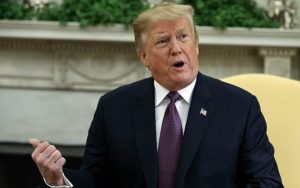Trump Peace Plan Economic Component to Be Revealed in June in Bahrain

Jared Kushner participates in a panel discussion during the TIME 100 Summit 2019 on April 23, 2019
Amir Tibon and Noa Landau write in Haaretz, “The Trump administration is going to release the economic component of its plan for Middle East peace in late June, the White House said Sunday.
The economic component of the plan will be revealed before the political component, which is still being discussed.
Its release will coincide with an international summit in Bahrain which will be hosted by the local government together with the United States, and will focus on ways to promote the Palestinian economy.
Israel’s Finance Minister Moshe Kahlon is expected to head the Israeli delegation to the summit. The Palestinian Authority, which has had no official contacts with the Trump administration since it moved the U.S. Embassy to Jerusalem last year, is expected to boycott the initiative. Private Palestinian businessmen are expected to attend.
The United States and Bahrain released a joint statement on Sunday saying that the summit will be titled “Peace to Prosperity” and will be “a pivotal opportunity to convene government, civil society, and business leaders to share ideas, discuss strategies, and galvanize support for potential economic investments and initiatives that could be made possible by a peace agreement.”
A senior White House official said on Sunday that the plan includes significant investments in the economy of Gaza, and that investments in Gaza will require a “stable” ceasefire agreement to remain in place. “There’s a tremendous amount of opportunity, the world is willing to step up and work on this,” the official said. “But that only happens if we can resolve some of the political issues. The two things go hand in hand. There is a real future that can be very exciting, but we have to work on these hard issues.”
The summit, named a “workshop” by some U.S. officials, will bring together finance ministers and global and regional business leaders.

US President Donald Trump speaks during a meeting with Hungarian Prime Minister Viktor Orbán in the Oval Office of the White House on May 13, 2019
One of the plan’s co-authors, President Trump’s son-in-law and senior advisor Jared Kushner said on Sunday that the Trump administration was “grateful” to Bahrain for agreeing to host next months’ gathering.
“We look forward to engaging with business and thought leaders from throughout the region and the world to build consensus around the best steps the international community can take to develop the foundation for a prosperous future,” Kushner added. “The Palestinian people, along with all people in the Middle East, deserve a future with dignity and the opportunity to better their lives.”
Kushner also said that “economic progress can only be achieved with a solid economic vision and if the core political issues are resolved. We look forward to presenting our vision on ways to bridge the core political issues very soon.”
According to CNN, the plan itself will have four major components: infrastructure, industry, empowering and investing in people, and governance reforms “to make the area as investible as possible.”
Kushner told CNN that “people are letting their grandfathers’ conflict destroy their children’s futures,” adding that the plan presents a viable path for moving forward.
Few details of the long-anticipated plan have been made public so far, but it has been widely reported that its political component will not include an independent Palestinian state.
Kushner hinted last month at the possibility that it includes limited autonomy for Palestinians. Speaking at a Time magazine event, Kushner said past negotiations over a two-state solution have “failed. New and different ways to reach peace must be tried.”
Another architect of the plan, U.S. Ambassador to Israel David Friedman, has said that Israel will maintain security control over the West Bank, suggesting limited autonomy for the Palestinians.

US Ambassador to Israel David Friedman at the US Embassy in Jerusalem, May 30, 2018
Last week, Palestinian Foreign Minister Riad Malki dismissed the effort in the United Nations, saying all indications are that Trump’s Mideast peace plan will be “conditions for surrender.” The Palestinians pre-emptively rejected any peace proposal amid concerns it would fall far below their hopes for an independent state. Their demand for a two-state solution is supported by the UN and almost all of its 193 member-states.
Israel currently has no official relations with Bahrain, but Israeli delegates will be allowed into the Gulf country for the summit. In November, Haaretz reported that Israel is working to establish diplomatic ties with Bahrain.” This article is printed in its entirety
